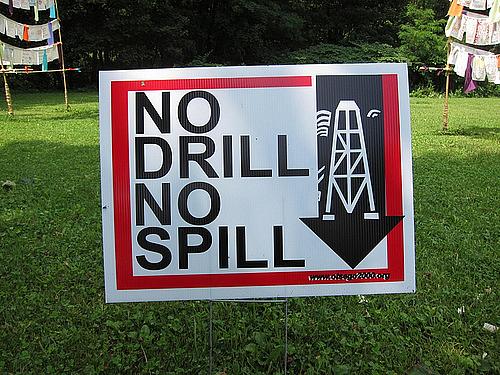Digging for the truth about fracking

When I was growing up, I feared radon.
It was the scentless, invisible gas that research said was giving us cancer by the tens of thousands. And we couldn’t do anything about it because it was just everywhere underground.
My bedroom was in the basement, and, after hearing about radon, I tried to avoid thinking about it. What could I do? And, besides, my parents were in the next room. Weren’t they doomed, too?
But every once in a while, mostly after falling asleep while reading a Stephen King novel, I would awake to the sensation that my body was pulsing with radioactive waves. I used to wonder if there might be a way to build a titanium chamber thick enough and deep enough to make the basement impermeable to the gas. Or could all the radon being emitted by the decaying uranium or thorium in the earth be syphoned off into a giant tube and funneled into space? (Can you tell I also was reading a lot of comic books?)
People hoping to make money off another underground gas – natural gas – aren’t talking about keeping the gas contained, of course. They are cracking open the earth in a process called fracking and letting the gas out as rapidly as possible, funneling the profits into their bank accounts. Yet there are big unanswered health and environmental questions surrounding this practice.
Nobody was ever accused of playing politics or killing jobs when fretting about radon. But by raising concerns about fracking, you can be called downright un-American. Don’t you want Americans to have good paying jobs? Don’t you want America to be energy independent?
Radon is found in natural gas, but the concerns about fracking have more to do with the chemicals used to extract the gas and the way they might – and have – contaminated underground water sources. Gas companies have fought to keep these chemicals a secret. It doesn’t help that when one of the chemicals is named it turns out to have harmful health effects. Katie Huffling at the Alliance of Nurses for Health Environments wrote in the Baltimore Sun:
Pepsi and Coke publish the ingredients in their products on every can; the producers of fracking chemicals can do the same without revealing exact formulas that would put a company at a competitive disadvantage. Companies don't want to disclose the chemicals because they know the substances are dangerous, and the industry knows the public would want to stop their use.
But maybe not. The public has a very high tolerance for chemicals. Anyone who lives in California knows about the legally-mandated warning signs that are placed on buildings telling you that the building contains chemicals that may be hazardous to your health and yet people show up for work every day just the same. Some of those ingredients in Pepsi and Coke are chemicals, and yet we guzzle them from cups that could be mistaken for bird baths.
Health writers can help keep the discussion apolitical by just asking tough questions of everyone involved in the debate. When activists raise the specter of chemical exposure, find out what studies have shown about exposure to those chemicals and make sure you’re not relying too much on studies funded by the chemical industry. (The Milwaukee Journal-Sentinel has done a great job monitoring industry-funded science.) When the gas industry responds that fracking methods are safe, ask them to name all the chemicals used in the fracking process and to show you the tests they have done on the surrounding water sources.
Silvia Secchi, assistant professor of energy and environmental policy at Southern Illinois University’s Department Of Agribusiness Economics, nicely summed up the debate and the need for smart decision-making in The Southern recently:
The hype and sensationalism of the current discussion on fracking are not helping us have an informed debate. In order to make good decisions about whether fracking should be promoted, we need to have much better information and solid scientific data in its environmental impacts and on the economy. Let us not forget, for example, that in the height of the ethanol boom, numbers on the job creation potential of the industry were sometimes vastly overestimated, largely by confusing temporary construction jobs with permanent ones. … There is no question that fracking has economic and energy security benefits — just as there is no question that it has negative environmental impacts. We need to quantify those costs and benefits and decide collectively whether the technology is worth pursuing.
Image Courtesy of Bosc d'Anjou
